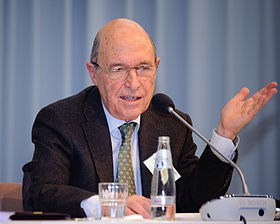Also known as:
Kostas Simitis, Konstantinos Simitis, Κώστας Σημίτης, Κωνσταντίνος Σημίτης
More People of Greece
More Topic Categories
Related Destinations
Costas Simitis (23/06/1936 - )
 Costas Simitis is a Greek university professor and politician. He was the Prime Minister of Greece from 1996 till 2004.
Costas Simitis is a Greek university professor and politician. He was the Prime Minister of Greece from 1996 till 2004.Born in Piraeus in 1936, his father was a lawyer and president at the Lawyer Society of Piraeus, while his mother was a member of many women’s organisations and president of the Panhellenic Union of Women. His parents participated in the National Resistance movement against Germans during the Occupation. Simitis studied law at University of Marburg in Germany and economics at London School of Economics and Political Science. He received his PhD from the Law School of the University of Marburg in 1959 and he later taught at the University of Constantia and University of Giessen. In 1977, he became a professor at Panteio University of Athens. He is married to Daphne Simiti and has two daughters.
In 1965, he participated in the foundation of the political science group “Alexandros Papanastasiou”, which aimed at studying the most important problems of Greek economy and society and providing solutions. Two years later, the group evolved to the anti-dictatorship organization “Democratic Defense”, which later participated in the creation of the PASOK political party.
He was a founding member of PASOK in 1974, but he was forced to resign in 1979, because he was considered responsible for propaganda. After the victory of PASOK at the 1981 elections under the leadership of Andreas Papandreou, Simitis was assigned to the Ministry of Agriculture and later, the Ministry of Finance. During the coalition government of 1989, he became Minister of Education and Religion, while in 1993 he became Minister of Industry, Energy, Research and Technology, as well as Minister of Trade.
In 1996, after Papandreou resigned due to deterioration of his health, Simitis was elected Prime Minister and emerged victorious during the elections that followed. In 2004, Simitis resigned from the PASOK leadership, and was succeeded by George A. Papandreou. As Prime Minister, Simitis tried to promote the role of Greece within the European Union, while the Greek-Turkish relationship improved significantly. He also considered the participation of Greece in the EMU to be more than necessary, as it would guarantee financial stability and growth; however, it was later found that the statistical records provided by the government in order to enter the EMU were false.
In 1999, the financial policy was shadowed by the so called “stock market scandal”. Simitis and the Minister of Finance at the time were criticized for pushing people into investing in stock, thus creating a financial bubble. Soon, the stock market crashed and many people lost their investments. In 2001, a great clash occurred between the Church and the State, after the latter’s proposal to remove the “religion” field from national identification cards. Archbishop Christodoulos fiercely opposed this decision, collecting over 3 million signatures from citizens and asking for a referendum. Nevertheless, the “religion” field was found to be anti-constitutional and touching on citizens’ personal information and was removed.
In general, as a prime minister, he followed a moderate foreign affairs policy, while trying to privatize the huge public sector, targeting at a financial stability that would abide by European Union policy.
See Also:
 Athens Photos
Athens Photos
 Santorini Photos
Santorini Photos
 Crete Photos
Crete Photos
 Meteora Photos
Meteora Photos
 Corfu Photos
Corfu Photos


